

Google Reader (1) What User Authentication to use? This question is the first topic for the new RESTful-Health-Exchange (RHEx) workgroup that is starting under the S&I Framework 'affiliation'.
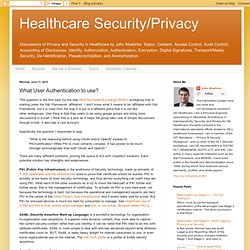
I don't know what it means to be 'affiliated with S&I Framework, but it is clear from the way it is put in a different place that it is not like other workgroups. One thing is that they seem to be using google groups and doing more discussions in e-mail. I think this is a plus as it helps the group take care of simple discussions through e-mail. It also has a cool acronym. Specifically the question I responded to was: "What is the reasoning behind using OAuth and/or OpenID instead of PKI/certificates? There are many different solutions, proving the space is rich with imperfect solutions. PKI (Public Key Infrastructure) is the workhorse of Security technology, made up primarily of X.509 certificates and the infrastructure used to prove that certificate should be trusted.
I prefer SAML, but do agree that OAuth is magical. ONC pilot uses tablets for HIE meaningful consent. Tags: healthcare tablets | HHS mHealth | iPad healthcare | meaningful consent | meaningful use | mobile health | ONC mHealth | The Department of Health and Human Services (HHS) plans to launch a pilot in September to determine whether patients can “meaningfully consent” to their data being shared with other health care providers using an application on a tablet in the waiting room.
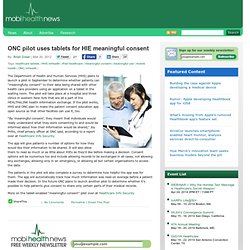
The pilot will take place at a hospital and three clinics in western New York that are all a part of the HEALTHeLINK health information exchange. If the pilot works, HHS and ONC plan to make the patient consent education app open source so that other facilities can use it, too. “By ‘meaningful consent’, they meant that individuals would really understand what they were consenting to and would be informed about how their information would be shared,” Joy Pritts, chief privacy officer at ONC said, according to a report over at Healthcare Info Security.
The VA's Evolving Mobile Device Strategy. Author Describes Disclosures Rule. Adam Greene Outlines Proposed Requirements ACQ Subscribe Adam Greene, the primary author of the proposed accounting of disclosures rule mandated under the HITECH Act, describes its major provisions and offers advice on how to prepare.The Department of Health and Human Services' Office for Civil Rights, in its proposed rule, takes a two-pronged approach, explains Greene, who recently left the office to join a Washington law firm.
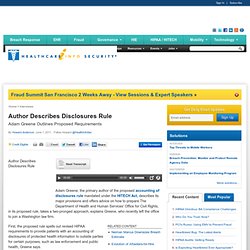
First, the proposed rule spells out revised HIPAA requirements to provide patients with an accounting of disclosures of protected health information to outside parties for certain purposes, such as law enforcement and public health, Greene says. Second, the proposal requires providing patients, upon request, with "access reports" that summarize who electronically accessed their information, Greene explains. In an interview, Greene: Describes how both provisions apply to designated record sets as defined by HIPAA.
Standards Meetings. Identity Crisis: An Examination of the Costs and Benefits of a Unique Patient Identifier for the U.S. Health Care System. A national health information network, or NHIN, that enables disparate health care information systems across the United States to allow authorized users to easily and quickly share critical health information has the potential to enhance safety and dramatically improve the quality and efficiency of the national health care system.
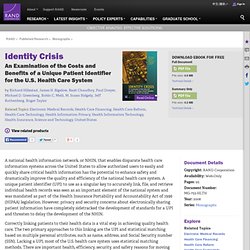
A unique patient identifier (UPI) to use as a singular key to accurately link, file, and retrieve individual health records was seen as an important element of the national system and was mandated as part of the Health Insurance Portability and Accountability Act of 1996 (HIPAA) legislation. However, privacy and security concerns about electronically sharing patient information have completely sidetracked the development of standards for a UPI and threaten to delay the development of the NHIN. Correctly linking patients to their health data is a vital step in achieving quality health care. This report is part of the RAND Corporation monograph series. Falling into Grace - Adyashanti.
Informed Consent – T.P. Caruso & Associates* T.P.
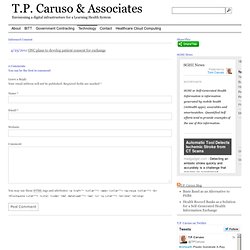
Caruso & Associates Envisioning a digital infrastructure for a Learning Health System Informed Consent 4/25/2011 ONC plans to develop patient consent for exchange. Open Online Privacy.